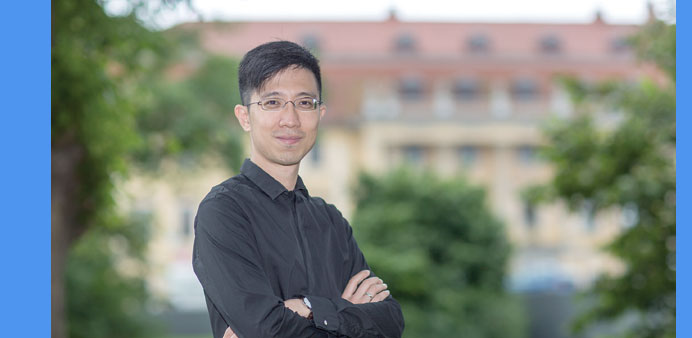Tung-Chieh Chuang, 32, a talented Taiwanese student of classical-music conducting, outside the College of Music in Weimar, Germany. He has won awards and has been signed up by a top
concert agent.
By Antje Lauschner
For Taiwan conductor Tung-Chieh Chuang, statistics and music have a lot in common.
“For me, music has a lot to do with structure and logic,” he says. The differences between it and statistics are not so great. Both are “dry and matter-of-fact” at the beginning, he adds.
Only when the musician adds his ability and emotion to a piece of music does it come alive. And that’s the same with statistics, he says, they only become alive and emotional when a scientist applies to them his knowledge and dedication.
The 32-year-old completed a degree in applied statistics in the United States before going on to do a diploma in conducting with German-born Otto-Werner Mueller.
After that he decided to take the concert diploma at Germany’s Franz Liszt College of Music in Weimar, the highest possible qualification a conductor can take.
For his final exam concert at the beginning of the university’s Weimar master classes recently, he enchanted audiences with his youthful charm and abandon, coupled with clear directions to the musicians of the Jena Philharmonic Orchestra.
He comes from a musical family and before taking a detour into the world of numbers he played the horn and the clarinet as a child.
His father is a professor of horn at the Art Academy of Taipeh and his mother is a cello professor. “They advised me to study in Weimar with Professor Nicolas Pasquet,” says Tung-Chieh Chuang.
“(As a conductor) you don’t touch any instrument, yet you still produce a sound. That’s magical,” he says. “As a conductor you have to grab and enthuse musicians with your ideas — without them becoming the conductor’s puppets.”
They have to produce what the conductor hears with their own souls. “In that moment the musicians become the conductor’s ‘instrument’,” he says.
Pasquet says Tung-Chieh Chuang has “an unbelievable sound in his hands” and radiates charisma and musicality as well as having the ability to deeply penetrate a score.
Of 17 students at Weimar studying conducting, the young man from Taiwan is the only graduate. The university, founded by the Hungarian composer Franz Liszt, has a reputation as the world’s “forge of conductors.” No other university sees its students so often stand at the helm of well-known orchestras.
“We can now choose the best,” says Pasquet. Prizes and fantastic performances by former students speak for themselves.
David Afkham is now head conductor at the Spanish National Orchestra in Madrid. Daniel Huppert is chief conductor at the Mecklenburg State Philharmonic Orchestra and Johannes Klumpp is chief conductor at the Folkwang Chamber Orchestra of Essen.
Tung-Chieh Chuang is enthusiastic about what he calls “slow Weimar:” in the peaceful eastern German town he has the ideal conditions to concentrate 100 per cent on his final concert exams.
He’s won three competitions this year, including the International Solti Competition in Frankfurt and the renowned Malko Competition in Copenhagen.
As well as money, the student won a raft of concerts with well-known European orchestras in Stockholm, Oslo, Munich and Vienna.
“I don’t actually like competitions,” he confesses. “But they’re key to a career.”
The door to success is wide open for him after top artist management company Schmid Konzertdirektion signed him up.
That means Tung-Chieh Chuang is on a list of other top conductors including English veteran Sir Neville Marriner and the Latvian Andris Nelson, music director of the Boston Symphony Orchestra.
One of his first engagements will see him conduct the Konzerthaus Orchestra of Berlin in the German capital, where he will see his younger brother — he plays the horn. -DPA

